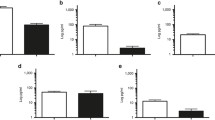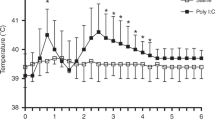Abstract
Objective
Neuroendocrine hormones have profound effects on the immune system. The immune response is a major factor in the pathogenesis of acute respiratory syncytial virus (RSV) infection. We hypothesised that there is a relationship between the neuroendocrine response in acute RSV infection, the severity of illness, and the degree of lymphopenia.
Design
Prospective, non-randomised cohort study of infants hospitalised for RSV infection requiring mechanical ventilation or managed conservatively. The study assessed the effect of age, gender, birth gestation, and severity of illness on stress hormone profile and its relationship to lymphocyte count.
Setting
Regional Paediatric Intensive Care Unit (PICU) and children’s wards.
Patients
Thirty-two consecutive infants with RSV infection were enrolled, of which thirteen were mechanically ventilated on PICU (study subjects) and nineteen treated on the ward (comparison group). Twenty-three children (72%) returned for follow-up.
Measurements and main results
A specific neuroendocrine profile was found in PICU patients compared to ward patients (Wilks Lambda = 0.36, F = 9.05, P =.03). PICU patients had significantly higher prolactin and growth hormone, and significantly lower leptin and IGF-1. Cortisol levels were the same. PICU patients were more lymphopenic compared to ward patients (P =.0001). On multiple regression analysis, prolactin and leptin levels accounted for 57% of the variation in lymphocyte count.
Conclusions
Whereas the effect of intensive care (mechanical ventilation and medication) could not be controlled for, our results suggest that there is an association between the neuroendocrine hormone response, severity of illness and degree of lymphopenia.

Similar content being viewed by others
References
Hall CB (2001) Respiratory syncytial virus and parainfluenza virus. N Engl J Med 344:1917–1928
Buck JJ, Debenham P, Tasker RC (2001) Prophylaxis for respiratory syncytial virus infection: missing the target. Arch Dis Child 84:375
O’Donnell DR, Carrington D (2002) Peripheral blood lymphopenia and neutrophilia in children with severe respiratory syncytial virus disease. Pediatr Pulmonol 34:128–130
Petrovsky N (2001) Towards a unified modal of neuroendocrine-immune interaction. Immunol Cell Biol 79:350–357
Ramaekers LHJ, Theunissen PM, Went K (1975) Acute lymphopenia, stress and plasma cortisol. Arch Dis Child 50:555–558
Berczi I (1997) Pituitary hormones and immune function. Acta Paediatr 423:70–75
Fantuzzi G, Faggioni R (2000) Leptin in the regulation of immunity, inflammation, and hematopoiesis. J Leukoc Biol 68:437–446
Okur H, Kucukaydin M, Ustdal KM (1995) The endocrine and metabolic response to surgical stress in the neonate. J Pediatr Surg 30:626–635
Orsini AJ, Leef KH, Costarino A, Dettorre MD, Stefano JL (1996) Routine use of fentanyl infusions for pain and stress reduction in infants with respiratory distress syndrome. J Pediatr 129:140–145
Guinsburg R, Kopelman BL, Anand KJ, de Almeida MF, Peres C de A, Miyoshi MH (1998) Physiological, hormonal, and behavioural responses to a single fentanyl dose in intubated and ventilated preterm neonates. J Pediatr 132:954–959
Gozal D, Colin AA, Jaffe M, Hochberg Z (1990) Water, electrolyte and endocrine homeostasis in infants with bronchiolitis. Pediatr Res 27:204–209
van Steensel-Moll HA, Hazelzet JA, van der Voort E, Neijens HJ, Hackeng WH (1990) Excessive secretion of antidiuretic hormone in infections with respiratory syncytial virus. Arch Dis Child 65:1237–1239
Zeitoun MM, Hassan AI, Hussein ZM, Fahmy MS, Ragab M, Hussein M (1973) Adrenal glucocorticoid function in acute viral infections in children. Acta Paediatr 62:608–614
De Kleijn ED, Joosten KF, Van Rijn B, Westerterp M, De Groot R, Hokken-Koelega AC, Hazelzet JA (2002) Low serum cortisol in combination with high adrenocorticotrophic hormone concentrations are associated with poor outcome in children with severe meningococcal disease. Pediatr Infect Dis J 21:330–336
de Groof F, Joosten KF, Janssen JA, de Kleijn ED, Hazelzet JA, Hop WC, Uitterlinden P, van Doorn J, Hokken-Koelega AC (2002) Acute stress response in children with meningococcal sepsis: important differences in the growth hormone/insulin-like growth factor I axis between nonsurvivors and survivors. J Clin Endocrinol Metab 87:3118–3124
Blanco-Quiros A, Casado-Flores J, Arranz E, Garrote JA, Asensio J, Perez A (2002) Influence of leptin levels and body weight in survival of children with sepsis. Acta Paediatr 91:626–631
Whelan P, Morris PJ (1980) Cortisol and postoperative blood cell counts. Lancet 1:828
Author information
Authors and Affiliations
Corresponding author
Additional information
Support: H.C. Roscoe Fellowship, British Medical Association, and Addenbrooke’s Paediatric Intensive Care Research Fund
Rights and permissions
About this article
Cite this article
Tasker, R.C., Roe, M.F.E., Bloxham, D.M. et al. The neuroendocrine stress response and severity of acute respiratory syncytial virus bronchiolitis in infancy. Intensive Care Med 30, 2257–2262 (2004). https://doi.org/10.1007/s00134-004-2470-7
Received:
Accepted:
Published:
Issue Date:
DOI: https://doi.org/10.1007/s00134-004-2470-7




